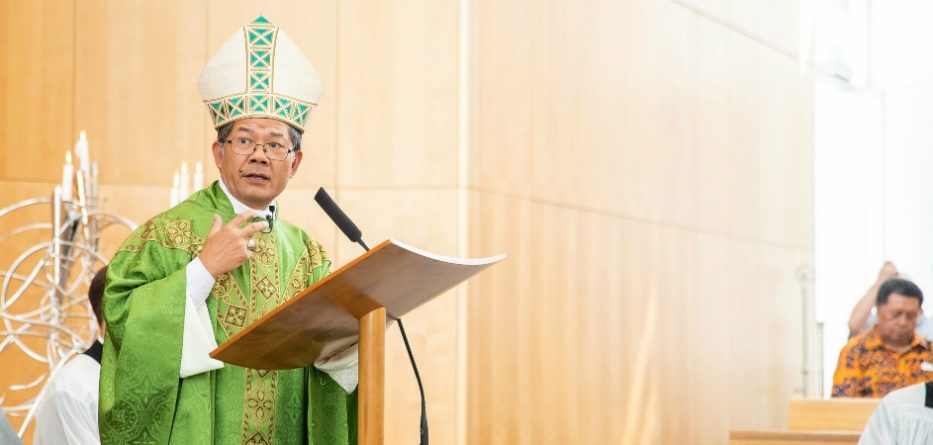Most Reverend Vincent Long Van Nguyen OFM Conv DD STL, Bishop of Parramatta
Homily for the 29th Sunday in Ordinary Time Year A 2020 at St Patrick’s Cathedral, Parramatta
Readings: Is 45:1-6; 1Thes 1:1-5; Matthew 22:15-21
18 October 2020
Listen to the homily here:
Witnessing to our Kingdom citizenship
Dear friends,
Which party should Catholics support and whom should they vote for? These questions have particular relevance now for our brothers and sisters in the United States as they face one of the most polarised presidential elections in living memory. In fact, so invested in their respective political parties, many American Catholics go so far as to condemn those who vote for the other side.
While the partisan fault lines may not run across Australia as deeply as they do in America, we can do with more civility in our search for the common good. As Christians, we have a duty to influence our society according to the principles and values of the Gospel. We are called to make a difference in the world in which we live.
This is the focus of today’s Liturgy of the Word. Believers are to be a shining light and a mirror of God’s Kingdom. In contrast to the harsh reality of an exploitative world for the poor, God’s people are called to be a community of justice, hospitality, and compassion.
In the first reading, the prophet Isaiah speaks of God’s rather surprising and unexpected way. After decades of exile in Babylon, the people would be able to return to their homeland thanks to an unlikely hero, Cyrus the king of Persia. Isaiah refers to Cyrus as God’s “shepherd” and, even, God’s “anointed one”. It is an extraordinary acknowledgement of a foreign ruler. God indeed could use an unlikely instrument to bring about His plan for the people.
The message of the prophet, however, did not stop with the benign king of Persia and his policy of repatriation. The returned exiles were to form a renewed community of faith in their homeland. Their mission was not to make Israel great again by way of restoring the Jewish monarchy. That golden era had turned out to be an illusion. Success had made them blind to God’s purposes. The exile enabled them to unlearn the way of the world and to refocus on the covenant. Their mission as they regrouped was to be a society in which the care of the most marginalised was to be the essential distinguishing feature. It was to be a contrast society in relation to the tyranny of the empire.
In the Gospel, Jesus reinforces the message of Isaiah. In response to the question of paying taxes to Caesar, Jesus asked for a coin and posed a rhetorical question “Whose image and inscription is it (on the coin)?” This would have exposed the hypocrisy of his questioners since it reminded them of the Shema, that is, the daily prayer calling them to worship God to the exclusion of all other gods. The Shema prohibits any form of carved images and requires the people to inscribe God’s covenant in their hearts. Hence, Jesus in a subtle way critiques the imperial ideology by referencing the demands of the Shema.
“Give back to Caesar what belongs to Caesar and to God what belongs to God.” This statement then is not an endorsement of a temporal order, let alone a corrupt imperial system based on a cult of personality. Rather, it invites the listeners to choose their allegiances. To the Jews, nothing belongs to Caesar. Empires have no power and authority over the land and its people because everything belongs to God. Jesus reasserted the deep belief that only God has real claim on us, and it is our duty to witness to our Kingdom citizenship.
Brothers and sisters,
We cannot live our faith to the full without embracing the challenge of the contrast society that our Jewish forebears attested to and the Kingdom vision that Jesus proclaimed by his words and deeds. The early Christians understood the significance of being fundamentally counter-cultural in how they lived, how they related, how they shared resources and how they showed the characteristics of an alternative society. In the second reading, Paul thanks God for the Christians in Thessalonika for their faith in action. They have turned to God from idols and embraced a life of faith, hope and love in contrast to their pagan counterparts.
As followers of Jesus, we too need to embody His Kingdom vision by showing a kinder, more inclusive, more caring alternative society under God’s rule. Pope Francis in his new encyclical has identified the imperial tyranny of populism, protectionism, and xenophobia. He appeals for a love that transcends borders and a social friendship that makes universal brotherhood possible. Let us pray even as we enact liturgically the Kingdom vision of Jesus in our Sunday’s Eucharist that we may be able to live up to that calling.








